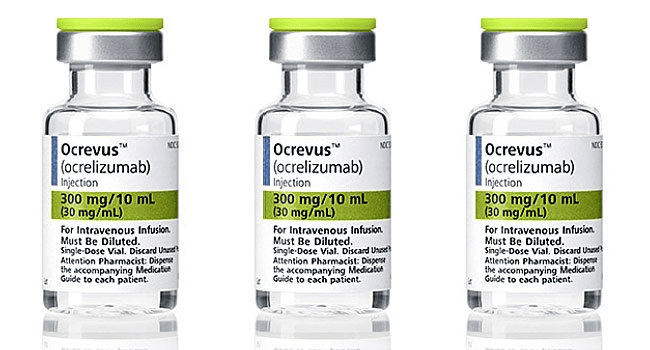
Sales of Roche’s new multiple sclerosis therapy Ocrevus more than tripled in the first nine months of 2018, helping to compensate for the loss of patent protection on its older blockbuster drugs.
Ocrevus (ocrelizumab) only made its debut in the US last year, but has already vaulted itself to blockbuster status, with sales up 238% to CHF 1.67bn ($1.68bn). Roche said it has seen strong uptake in both relapsing-remitting and primary progressive forms of MS in the US, which still accounts for more than 90% of the drug’s sales, with Europe gaining traction with sales of CHF 130m.
Some analysts had predicted Roche would see sales decline around 9% this year due to biosimilar competition. However, the performance of Ocrevus and other drugs such as HER2 breast cancer therapy Perjeta (pertuzumab) and lung cancer therapy Alecensa (alectinib) – plus a strong showing in Asia-Pacific markets led by China – have kept it on course for mid-single-digit growth.
Another bright spot for Roche was strong early uptake of new haemophilia A therapy Hemlibra (emicizumab), a blockbuster-in-waiting which added CHF 113m to the pot from its use in patients with inhibitors and has just won approval for the much larger non-inhibitor patient population.
As expected, biosimilar competition to two of its top products – MabThera and Herceptin – weighed heavy on Roche in the third quarter in Europe.
Sales of immunology drug MabThera (rituximab) in the EU were almost cut in half in the first nine months of 2018 – falling 48% to CHF 3.2bn – but were only down 9% overall thanks to gains in the US, where it is sold as Rituxan, as well as international markets, particularly China.
Meanwhile, breast cancer therapy Herceptin (trastuzumab) also continued its European decline thanks to biosimilar competition, failing 10%, but grew 2% to CHF 5.3bn overall and is once again Roche’s top-selling drug.
The third of Roche’s ‘big-three’ antibody blockbusters – cancer therapy Avastin (bevacizumab) – also rose 2% with gains in international markets propping up flat US sales and a decline in Europe.
Tecentriq static
One disappointment for Roche is its new immuno-oncology drug Tecentriq (atezolizumab). The none-month figures show some headway in bladder and lung cancer compared to the first nine months of 2017, with a gain of 49% to CHF 524m, but once again revealed its weakness in the quarterly figures.
In the third quarter of this year, sales of Tecentriq were CHF 110m, which is fractionally below its tally in the same period of 2017, and the product has obstinately stayed at around that level each quarter in the interim.
The company is hoping that new indications will get growth back on track, but had a setback to those plans last month when Tecentriq missed the mark in a first-line non-small cell lung cancer (NSCLC) trial.




